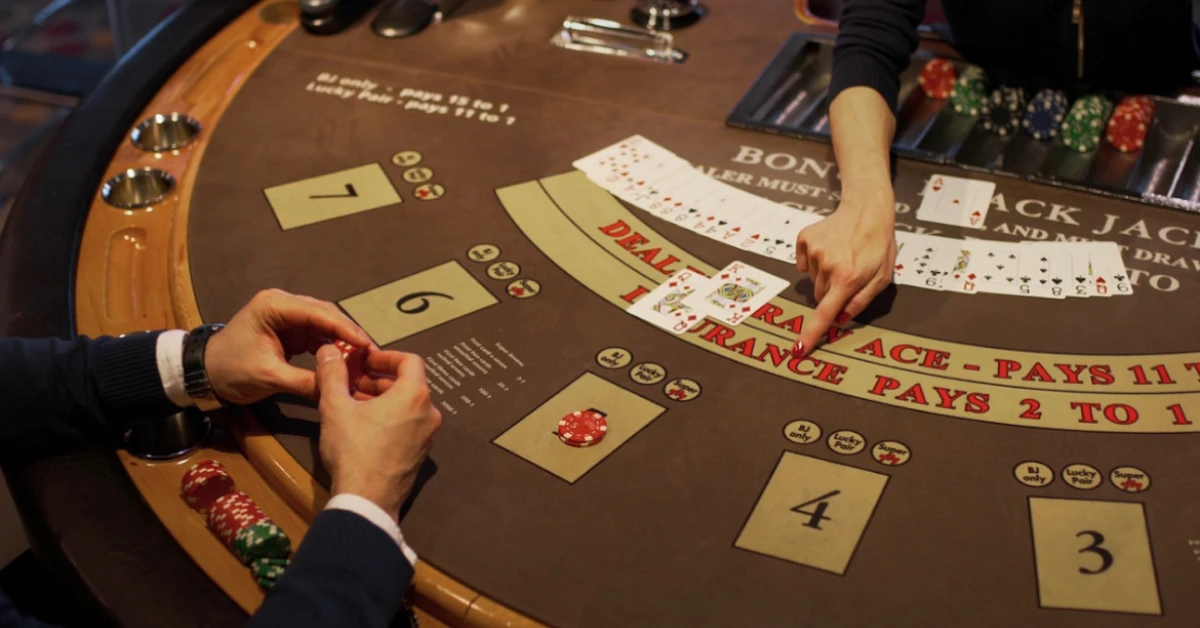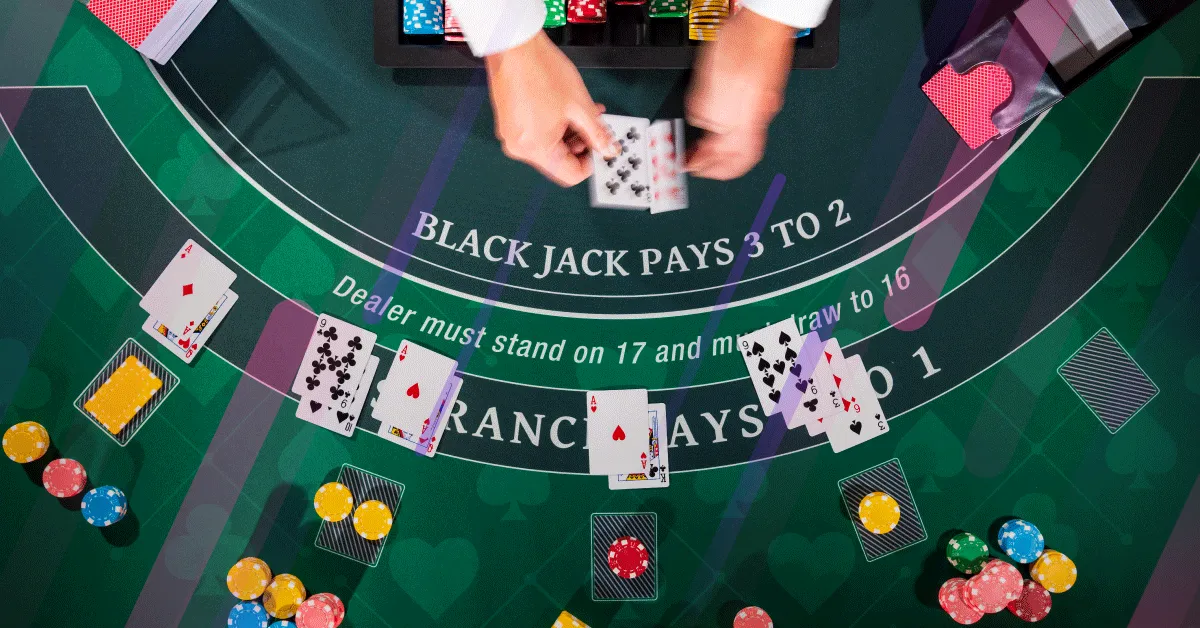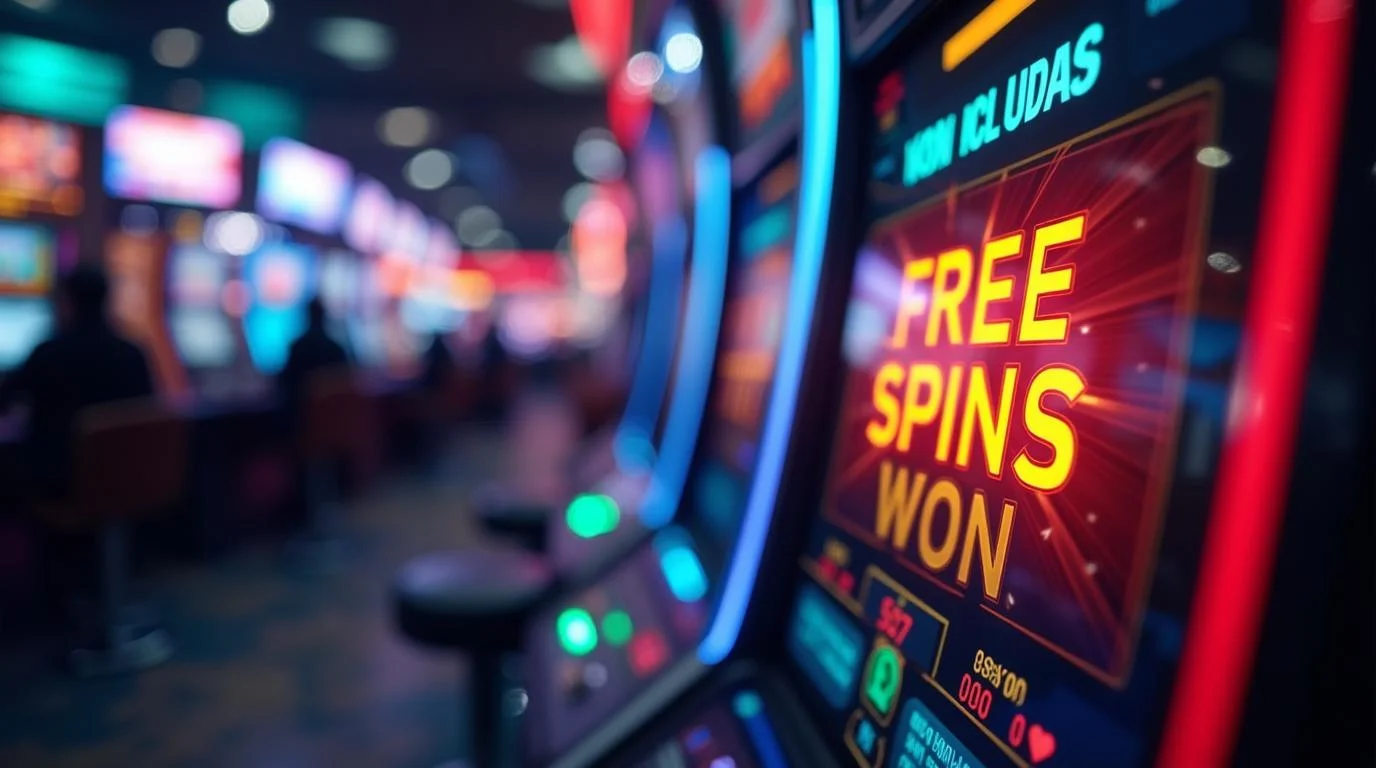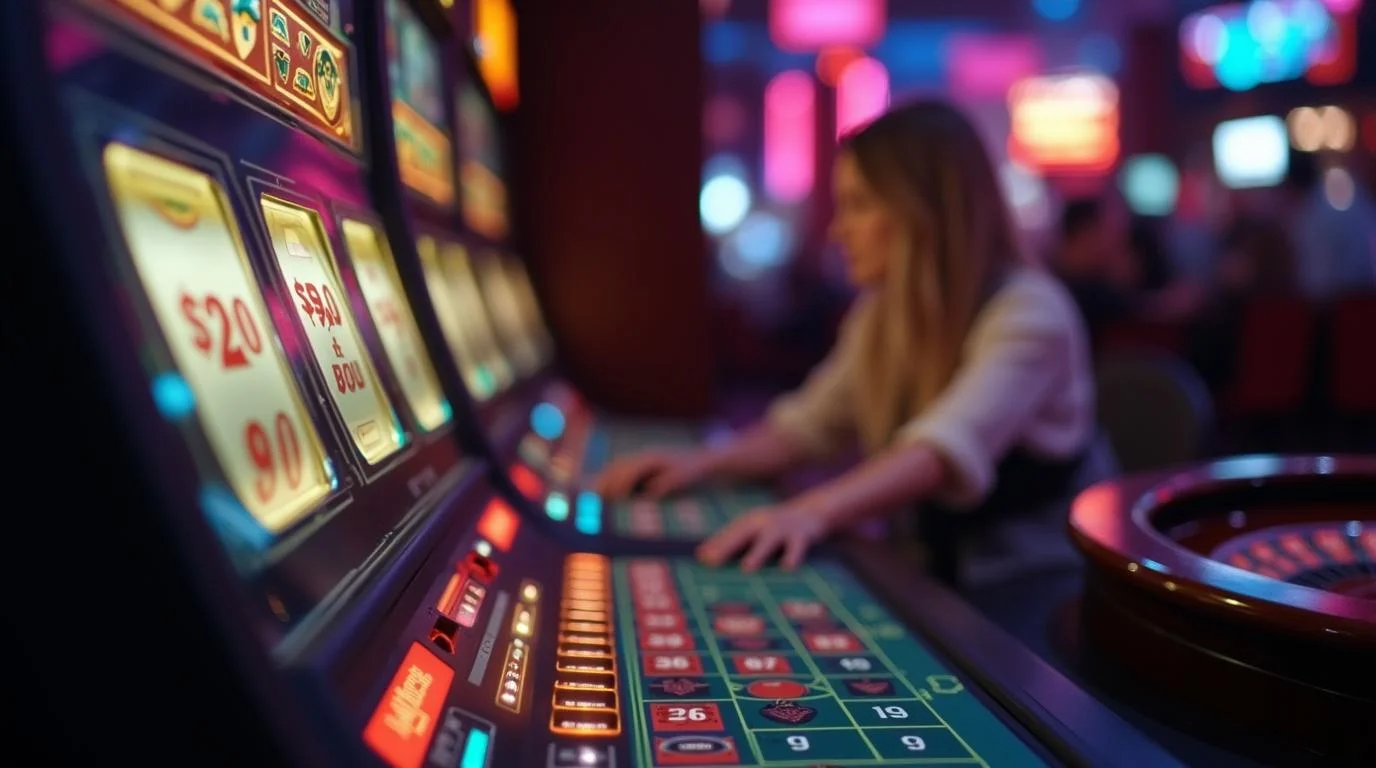If there's one thing you should know from the very beginning, it's this: nobody – and we mean nobody – can absolutely control dice. This means that nobody can accurately roll specific numbers just because they want to; nobody can really control them at will, no matter what kind of dice setting and dice controlling strategy they have. But there's a tiny caveat to this as well: you can still develop a certain throwing technique, and you can develop this toss with lots of practice. Through this ‘toss,' you can finally get to a point where your dice will remain on the axis – meaning they will rotate forward together in sync – and this can often be enough to turn potential losses into frequent wins.
This is our ongoing tribute to the game of craps – but this time, we will talk about dice control at length. We will explore the origins, the techniques, and even the controversies and personalities that have defined and shaped dice control to what we know today. So are you a craps enthusiast, a curious gambler, or even a skeptic to the art of dice control? This article lays bare the full story behind this elusive skill and lets you have a full understanding of its merits – and, fundamentally, how to take advantage – if you can, that is.
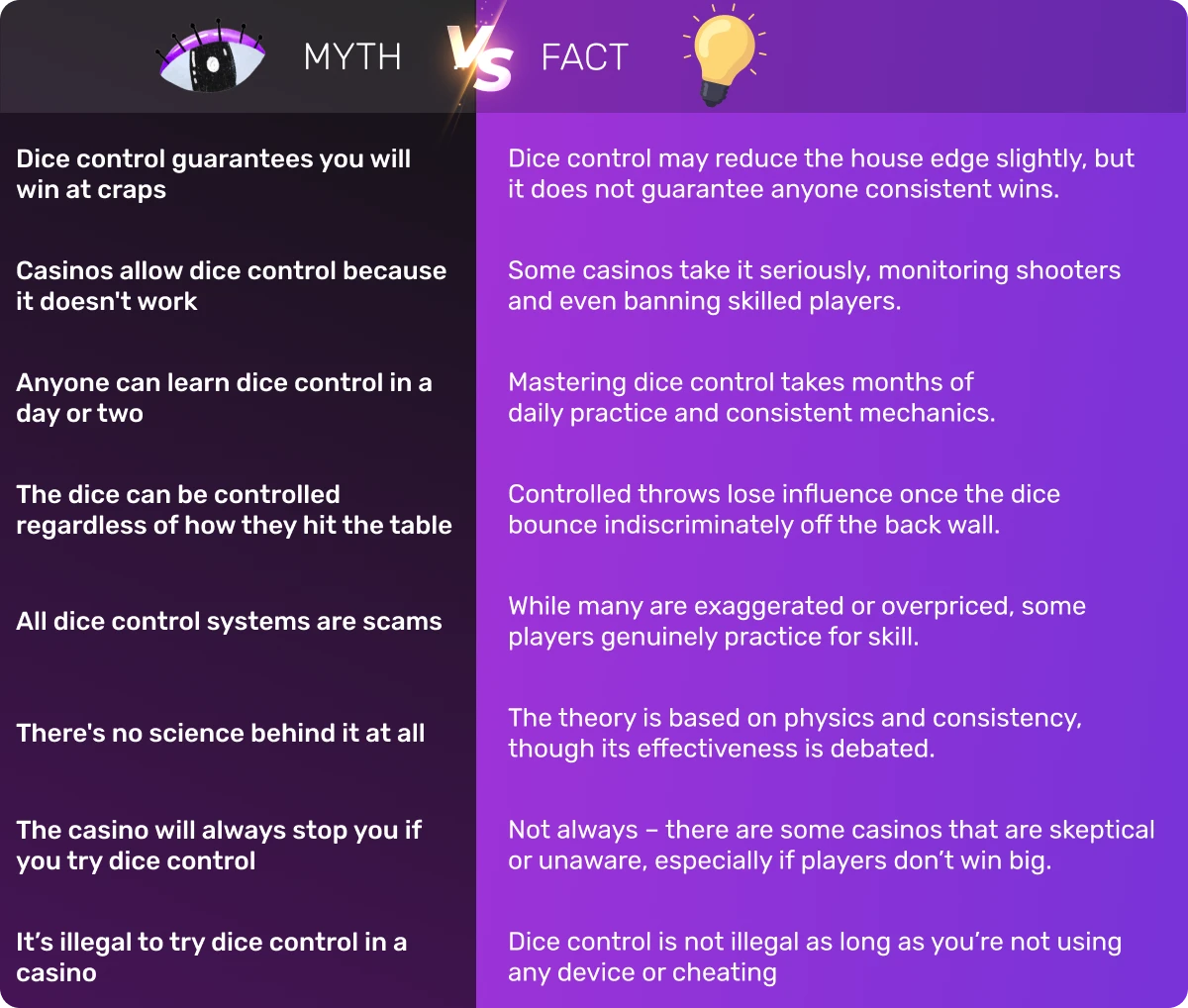
What is dice control?
You are probably already familiar with dice control but would like to learn more about it. Simply put, dice control (it is also referred to as ‘rhythmic rolling' or ‘controlled shooting') is the theory that a player can influence the outcome of a roll through precise mechanics - specifically focusing on the grip, stance, delivery, and release of the dice, in that order. The ultimate goal is to minimize randomness and produce repeatable results that shift the probabilities of certain dice combinations appearing more frequently than others.
Proponents to dice control and dice setting argue that if dice are thrown with just the right amount of spin, speed, and arc - while also ensuring they hit the back wall of the table in a controlled way - they can defy the laws of randomness or pure chance. The skeptics of dice control, however, believe that once the dice bounce, especially off the rubberized backstop, the outcome is irreversibly randomized.
What is a ‘perfect roll’?
A perfectly executed dice toss keeps both dice rotating in sync along the same axis for about four full spins. When they stay on axis, only 16 outcomes are possible instead of the standard 36. If they rebound cleanly, only one group of faces - top, front, bottom, or back - is likely to appear. That’s why many players focus on those favorable outcomes to gain an edge.
The main theory behind dice control
The theoretical foundation of dice control is rooted in physics - not magic, contrary to popular belief. The idea behind it is that by reducing the variables in a dice toss - specifically how much the dice tumble and how they interact with the table – any player can influence which numbers come up. Unlike roulette wheels or slot machines, which are entirely independent of the operator, craps is a rare table game where the player physically interacts with the game's central mechanism: the dice.
That's why a lot of experts say that the key to dice control and dice setting craps is consistency. This means using a repeatable grip (often the 3-finger or 5-finger dice set, whichever grip you find yourself comfortable with) and aligning the dice symmetrically - and finally, throwing them with synchronized rotations to land softly. The “dice set” refers to how the dice are positioned before the throw, often using combinations like the Hardway Set or 3V Set to favor certain outcomes.
In theory, if a player can reduce the number of revolutions and the energy with which the dice hit the back wall, the player can minimize randomness. It's not really about choosing an exact number per se though - it's about skewing the probability curve slightly, just enough to reduce house edge on bets like the Pass Line or maximize returns on Place Bets.
The science (and the skepticism) behind dice control
While the physics of dice control is plausible, it's also quite fragile. Think about it: casinos go to great lengths to prevent any dice influence. This includes using bouncy felt layouts, requiring the dice to hit the back wall, and employing surveillance to spot any unusual rolling patterns.
We must admit, numerous studies and simulations have cast doubt on the reliability of dice control. Independent mathematicians and physicists argue that the chaotic nature of a dice roll - especially after hitting the pyramidal rubber wall - makes consistent influence nearly impossible.
But here's the twist: even if the edge you gain is minuscule - say, changing the probability of rolling a seven from 16.67% to 15.5% - that would be enough, over time, to turn the house edge on its head.
Remember: Even though the house edge in craps is small, you don’t have to throw perfectly every time to reduce it. Improving consistency in your toss can still help give you a stronger chance at winning over time.
What is dice setting in craps?
There is also a question of dice setting. What is it, and is it different from dice control? Dice setting craps is a technique used by some players who believe they can influence the outcome of their rolls by carefully arranging (or "setting") the dice before tossing them. The idea behind this is to control how the dice move through the air and bounce off the table, and this is said to reduce randomness and improve their chances of rolling specific numbers.
Here's how it works in simple terms: Before a shooter rolls the dice, they line them up in a specific way - that's the dice sets craps. They position both dice so certain numbers are facing up and others are aligned on the sides. The shooter then tosses the dice using a controlled motion - often gently and with as little spin as possible - in the hopes that the dice stay together, rotate evenly, and land in a predictable way.
For example, some players use what's called the "3V" set, where the 3s on each die form a V shape. This set is believed to increase the chance of rolling 7s or certain combinations, depending on how it's thrown, and it may help you with your goal on how to set dice in craps.
- Dice setters want to reduce the number of random bounces and wild spins so they can avoid rolling 7 (in specific situations) or hit numbers they've bet on more frequently.
- It's wise to note that craps dice sets in casinos are actually allowed as long as players don't delay the game or throw the dice in an odd or suspicious way. However, most experts - and casinos - are skeptical that dice setting offers any real advantage. The bounce off the back wall, the felt surface, and many other factors introduce enough randomness to make true control very difficult, if not impossible.
Still, for many players, dice setting is part of a larger belief in dice control - the controversial idea that, with enough practice, someone can influence the odds in craps and tilt them slightly in their favor.
Is there a difference between dice setting and dice control?
Yes, there is a difference between dice setting and dice control in craps, although they're closely related and often discussed together. So what is the difference between the two? Here's what you should know:
Dice setting: the setup
Dice setting is the act of physically positioning the dice in a certain way before you toss them. The goal is to arrange the dice so the most desirable numbers are facing up and oriented in a specific direction.
For example:
- A common set is the 3V set, which is often used to reduce the chances of rolling a 7.
- Another is the Hardway set, aimed at hitting hard 4s and 6s as well as 8s and 10s.
This is all about preparation. You're “setting” the dice in a controlled starting position with hopes that, if you toss them consistently, they will land in a predictable manner.
Dice control: the execution
Dice control, also known as controlled shooting, is the toss technique that follows the set. It's about delivering the dice in a way that reduces randomness - mainly by keeping the dice rotating together on the same axis, bouncing predictably, and minimizing erratic movement.
To give you a better idea, a controlled shooter will:
- Use a consistent grip and toss
- Keep the dice flying together (ideally side-by-side)
- Try to hit the back wall softly and squarely
The theory is that if you can keep the dice from tumbling wildly and maintain their set orientation through bounce and flight, you can reduce the randomness of the outcome, and possibly influence which numbers show up more often.
The main differences between dice setting and dice control
| Aspect |
Dice setting |
Dice control |
| What it is |
Positioning the dice before the toss |
Tossing the dice in a consistent and controlled way |
| Purpose |
To start the dice in a favorable position |
To maintain axis and reduce randomness during the toss |
| Skill required |
Basic knowledge of dice sets |
Advanced practice and muscle memory |
| Result |
Alone, it changes nothing – it's just the setup |
It can theoretically influence outcomes if combined with dice setting |
Remember: Dice setting is just the starting point. Without solid dice control, it's mostly for show. Real advantage players focus on mastering both setting and tossing techniques.
How to master your dice grip
In the ever-fascinating world of dice control, the way you grip the dice is critical to helping you achieve a consistent and effective toss. What you should know from the get-go is that dice setters use a variety of grips - each with its own technique and purpose - to improve their chances of keeping the dice “on axis” and limit randomness.
But after some time, even the most practiced shooters can find that their once-reliable tosses no longer produce the same results. When this happens, many players turn to professional dice coaches – and you can, too. These experts help diagnose what has gone wrong and guide the player back to form. Sometimes the issue is minor and easy to correct, but it's often difficult for the player to fix the problem alone. It's worth looking into if you're really serious about mastering the way you grip the dice.
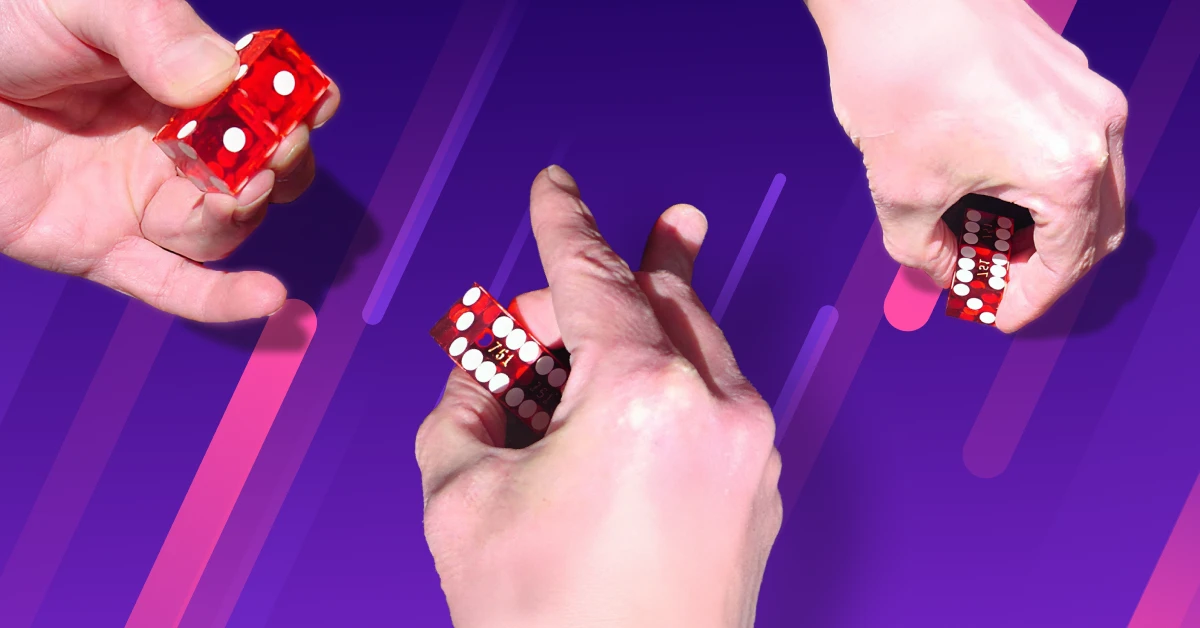
That being said, here are some of the most commonly used dice grips in controlled shooting:
- Two-finger grip: In this grip, the shooter uses their thumb and either their first or second finger on the opposite sides of the dice, applying even pressure where the two dice meet. This grip focuses on control and symmetry.
- Three-finger grip: This method places three fingers across the front face of the dice, about one-third of the way down, with the thumb positioned at the back. It offers a firm yet balanced hold and is favored for its stability during the toss.
- Ice tong grip (typically used from the end of the table): The ice tong grip resembles the way ice tongs grip a cube, and the shooter places their thumb and finger on the outer sides of the dice. The grip is held low, with both the thumb and finger making contact with the tabletop. Afterwards, an upward forearm swing keeps the dice aligned, and the grip creates backspin by rotating the dice along an axis running through their bottom-front corners. This technique is designed to maintain the dice on axis during their 14-foot flight to the back wall.
- Stacked grip: With the stacked grip, one die is stacked directly on top of the other to form a vertical column. A finger holds the top die in place during the toss. The goal of this grip is for the top die to "freeze" the bottom one on impact - ideally, the number showing on the bottom die remains unchanged after the toss.
Each of these grips has its place in a dice setter's arsenal. Needless to say, mastery often involves trial, error, and professional feedback, but with enough repetition and coaching, any dice shooter can gain control and consistency to their game.
The basics on craps dice combinations
When it comes to craps dice combinations, what you also should keep in mind is this: in the game of craps, you roll two six-sided dice, and each die has numbers from 1 to 6. When you roll the dice, the total (or sum) of the two numbers determines what happens in the game.
There are 36 different combinations you can roll because each die has 6 sides, and 6 × 6 = 36.
How the combinations work: Let's take the number 7 as an example.
To get a total of 7, you could roll:
- 1 + 6
- 2 + 5
- 3 + 4
- 4 + 3
- 5 + 2
- 6 + 1
So even though 7 is just one number, there are 6 different dice combinations that can add up to 7.
Some totals, like 2 and 12, only have one combination each:
Others, like 6 and 8, have five combinations each.
Why this matters in craps:
Each total has a different chance of being rolled based on how many combinations make it up. For example:
- 7 is the most likely number (6 ways to get it).
- 2 and 12 are the least likely (only 1 way each).
This is important because different bets in craps depend on what numbers come up - and the more combinations a number has, the more likely it is to be rolled.
Dice totals and combinations in craps
| Total |
Number of combinations |
Examples of dice rolls |
Odds (out of 36) |
| 2 |
1 |
(1,1) |
1 in 36 |
| 3 |
2 |
(1,2), (2,1) |
2 in 36 |
| 4 |
3 |
(1,3), (2,2), (3,1) |
3 in 36 |
| 5 |
4 |
(1,4), (2,3), (3,2), (4,1) |
4 in 36 |
| 6 |
5 |
(1,5), (2,4), (3,3), (4,2), (5,1) |
5 in 36 |
| 7 |
6 |
(1,6), (2,5), (3,4), (4,3), (5,2), (6,1) |
6 in 36 |
| 8 |
5 |
(2,6), (3,5), (4,4), (5,3), (6,2) |
5 in 36 |
| 9 |
4 |
(3,6), (4,5), (5,4), (6,3) |
4 in 36 |
| 10 |
3 |
(4,6), (5,5), (6,4) |
3 in 36 |
| 11 |
2 |
(5,6), (6,5) |
2 in 36 |
| 12 |
1 |
(6,6) |
1 in 36 |
Main takeaways
- 7 is the most common roll with 6 combinations (1 in 6 chances).
- 2 and 12 are the rarest, with only 1 way each (1 in 36 chances).
- The combinations are not evenly distributed, which is why some numbers hit more often than others.
- These odds influence what bets are better or worse in craps.
What is the best dice set to avoid rolling a 7?
In craps, the best dice set to avoid 7 is commonly considered the 3V Set.
What is the 3V set?
The 3V Set gets its name because when it is properly set, the 3s on each die form a "V" shape when you view it from the top. Here's how the dice faces are typically arranged in the 3V:
- Top faces: 3 and 3
- Front faces (facing the shooter): 5 and 5
- Back faces: 2 and 2
- Bottom faces: 4 and 4
- Sides: 6 and 1 on opposite sides
Why use the 3V set?
The 3V Set is popular among dice controllers because:
- It minimizes the chance of a 7 if the dice stays on axis and rotates correctly.
- It maximizes the chance of hardways (like hard 4, 6, 8, or 10), which pay better than easy ways.
- It helps favor box numbers like 6 and 8, which are great for place bets or pressing up.
How the 3V set helps avoid the 7
There are six total combinations that add up to 7 out of 36 possible outcomes with two dice (16.67% chance). Your goal with the 3V Set is to reduce randomness by keeping the dice rotating in a tight, controlled and forward motion, ideally staying on the same axis they started on. If the dice stays on axis, you can reduce the likelihood of rolling combinations that produce a 7, and that is why the 3V set is considered the best dice set to avoid 7.
With perfect on-axis rolls using the 3V Set, the dice are more likely to land on combinations like:
- 4 (2+2)
- 6 (3+3)
- 8 (4+4)
- 10 (5+5)
These are high-payout or favorable numbers for many betting strategies.
Note:
- No dice set can fully eliminate the chance of rolling a 7. Even the best shooters can't overcome all randomness.
- Staying on axis is critical. If the dice hit the back wall poorly or tumble erratically, any set advantage disappears.
- A repeatable grip and consistent toss are more important than the set you choose.
The origins of dice control: who started it all?
Interestingly enough, the origins of dice control trace back to gamblers who were looking for any way to beat the casinos without cheating outright. The concept became more popular in the 70s and 80s, and this was also the time when stories began surfacing about craps players who allegedly had a ‘near-mystical' ability to win.
But the modern ‘scientific' approach to dice control began in the early 2000s, especially with the publication of books and courses that claimed to teach the method. All of a sudden, it wasn't just a secret hustle - it was a system, marketed and sold to eager players. Following are the most popular names associated with dice control:
1. Dominator: the king of dice control
No name is more closely associated with dice control than Frank Scoblete – who is also known in the gambling world as “The Dominator.” Scoblete was a former actor and schoolteacher who wrote about dice control in books like Golden Touch Dice Control Revolution, Beat the One-Armed Bandits, and Beat the Craps Out of the Casinos, his most popular book. He claims to have studied under a mysterious master known only as The Captain, and soon began teaching seminars on controlled shooting.

The Dominator holds weekend seminars and boot camps across the country. Participants are taught detailed mechanics: grip, stance, arm motion, follow-through - all designed to reduce randomness in dice throws. He has also been known to sponsor jamborees dedicated to gambling. Scoblete insists that with practice, players could gain a 1 - 2% edge over the casino. Critics call it pseudoscience - yet others point to actual winnings.
2. The legend of “The Captain”
Frank Scoblete often credits his dice control philosophy to a reclusive gambler he refers to only as “The Captain.” This enigmatic figure allegedly spent decades perfecting his throw and teaching a select few disciples.
According to Scoblete, The Captain's greatest accomplishment came during a legendary roll that supposedly lasted 147 minutes and 89 rolls before a seven-out. Whether myth or fact, this story has become central to the lore of dice control. The Captain has passed on to the great casino in the sky, but one thing's for sure: he will live on and continue to inspire gamblers through Frank Scoblete's books.
3. Stanford Wong: the analyst
Another famous name in the world of controlled shooting is gambling author Stanford Wong (a pseudonym; his actual name is John Ferguson), a highly respected gambling theorist and mathematician. He is known for his groundbreaking work in blackjack, especially his best-selling book, Professional Blackjack, and his blackjack odds analyzing software, Blackjack Analyzer. He attended dice control seminars and wrote about the subject, and he also operated a team of players that joined tournaments in blackjack, video poker, and craps.
Although Wong approached the topic with healthy skepticism, he acknowledged that under very controlled conditions - like a home table without a back wall - skilled shooters could show a statistical bias. But in the chaos of a casino, even he admitted it was extremely difficult to prove dice control, although in his book Wong on Dice, he showed how craps can be beaten with the controlled throwing of dice.
Can you really learn dice control?
If you didn't know by now, the commercial side of dice control has exploded in recent decades. From weekend workshops costing thousands of dollars to YouTube tutorials and books, the idea that one can learn to control dice has become a small industry.
The supporters of dice control claim it takes months of daily practice. You also have to have a custom-built practice rig and thousands of repetitions in order to become proficient. They also stress the importance of muscle memory and focus as well as the elimination of variables. On the other hand, the critics of dice control argue that the only people reliably making money off dice control are the ones selling lessons.
Yet in spite of all the controversy, thousands have attended training sessions in Las Vegas, Atlantic City, and anywhere else casinos are prevalent and legal. For many, though, it's not even about making money - it's about mastering a skill and engaging more deeply with a game they love.
Modern-day dice control celebrities
If you're really serious about perfecting your throw and technique, you may want to look at some celebrities and their own performances. While the original dice control names like the Dominator laid the foundation, newer personalities have emerged in this digital age – and you just might get inspiration from their moves. Below are several celebrities who have gained recognition in craps dice throwing:
- Howard “Rock ‘n’ Roller” Newman: Sadly, Rock ‘n’ Roller Newman passed away in June 2024. But he has taught dice control since 2021, and he has been a student of Scoblete – Scoblete even named him ‘The Babe Ruth of Dice Control.' He became a prominent controlled shooter and instructor with a reputation for disciplined practice. You can still watch him on YouTube and learn about his dice control strategies through his website, HowardRocknRoller.com.
- Chris Pawlicki: Chris Pawlicki has also earned the nickname ‘Sharpshooter’ because of his noteworthy skills and prowess. A co-founder of Golden Touch, Pawlicki helped shape the structure and style of dice control training. He is also the author of the bestselling book, How to Control the Dice, and manages a dice control team known as Rosebud.
- Beau Parker: based in Las Vegas and teaches his passion - dice control. He became an independent dice control instructor known for a more laid-back, one-on-one coaching style.
- Steve Haltom: (known by the sobriquet, ‘Heavy’) is the author of Axis Power Craps and is also a dice control teacher who runs forums, seminars, and regional boot camps on controlled shooting and craps betting strategies.
These modern figures associated with dice control and precision throwing are a lot more transparent than their predecessors, often posting videos, blogs, and testimonials – and the people who follow them swear by their teachings.
How to develop your own dice control technique and strategy:
-
Master a consistent toss: it's about quality over quantity
When it comes to developing dice control, your focus should be on consistency and form – not just tossing dice over and over again. Every toss you make should be made with purpose, aiming for as close to perfection as possible. The goal is for you to build muscle memory, where each grip, toss, and release becomes automatic and repeatable. This isn't something that happens in a week or two, mind you – it takes time, discipline, and commitment. Stick with it, and guaranteed improvement will come.
-
Know the value of practicing on a realistic setup
Practicing on a casino-style craps table can significantly speed up your progress. While it’s an investment, many players build their own practice tables from scratch for several hundred dollars. But if you can’t build a full-sized table, start small. Even a tossing station and a dice-catching box will do. But one highly recommended feature is a built-in chip rail. Having to lean over a rail to toss mimics real casino conditions and helps develop proper form for live play.
-
Experiment with releases and grips
Don’t be afraid to try out different grips and release techniques. The best dice control setup is the one that feels natural to you and produces the kind of results you’re after. There’s no one-size-fits-all approach here – every shooter is different. You should use your practice sessions to discover what works best for your hand size, finger strength, and comfort.
-
Adapt to table conditions
Practicing at home can sharpen your skills, but no two casino tables are exactly alike. That’s why adaptability is crucial. Once you’re in the casino, you will find that table conditions – especially the amount of bounce on the surface – can dramatically affect how the dice behave. For instance, soft, bouncy tables require a softer, lower toss to avoid erratic dice movement. In contrast, harder tables can handle a slightly higher toss. You may also need to adjust the distance you throw down the table. Learning to make these minor adjustments on the fly is a key part of becoming a skilled dice controller.
The ongoing debate over dice control: what you should know
So where does the dice control debate stand today? Supporters swear by it, pointing to wins, statistical records, and even video proof of long rolls and consistent patterns. They treat dice control as a martial art, which is part discipline, part belief, and part skill.
Meanwhile, skeptics - including professional gamblers and mathematicians - say dice control is largely confirmation bias. They argue that controlled throws are a mirage, and that most so-called dice controllers lose money just like the rest of the crowd.
Ultimately, dice control remains in the gray area of gambling – this means it is not quite provable, but not fully disprovable either. It lives in that space where probability and psychology intersect, and where there is a smattering of passion, too. So it's really up to you whether you want to believe in the merits of dice control or not. We at GambleSpot are just here to relay the facts, tell you what we know, and give you a tip or two.

Should you try dice control?
At the end of the proverbial day, it all boils down to a single question: should you try dice control? If you're intrigued by dice control, our best advice is to approach it as a hobby, not a guaranteed winning system. It's crucial to set realistic expectations and avoid expensive seminars until you've done your research. And remember: you should also never gamble more than you can afford to lose.
The beauty of craps is that it's communal and fast-paced, and it's undoubtedly a thrilling game - but dice control adds another layer of engagement for those looking to explore the depths of the game. And truthfully, whether or not dice control works, the journey of learning, practicing, and connecting with fellow players can be immensely rewarding. So go ahead, no one's stopping you from building a practice rig, perfecting your grip, and learning the 3V set. Just don't forget the golden rule of gambling: the house always has an edge - unless, just maybe, you learn to control the dice.



















